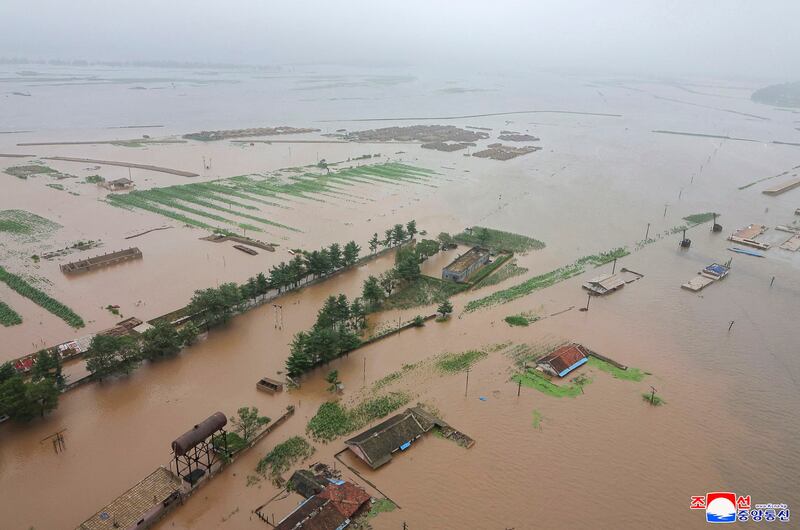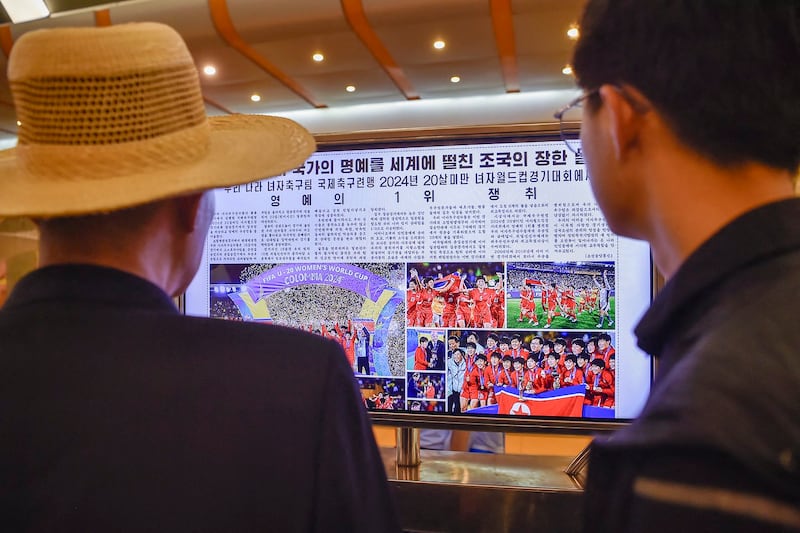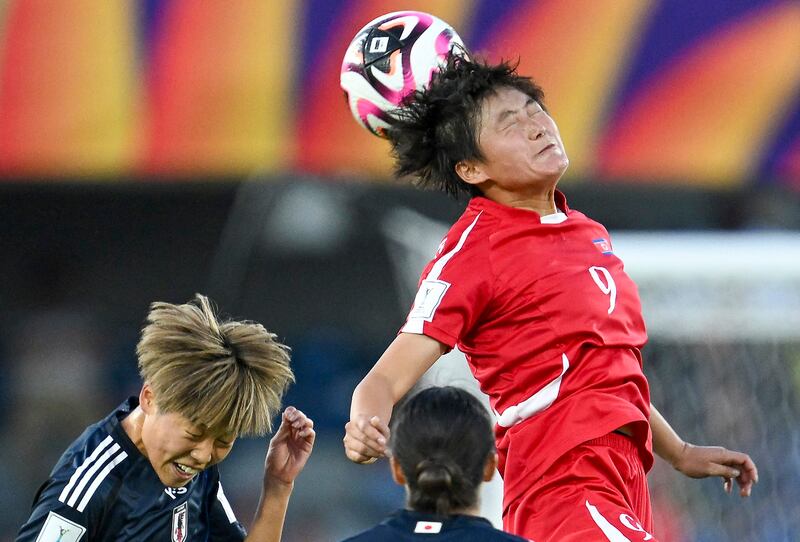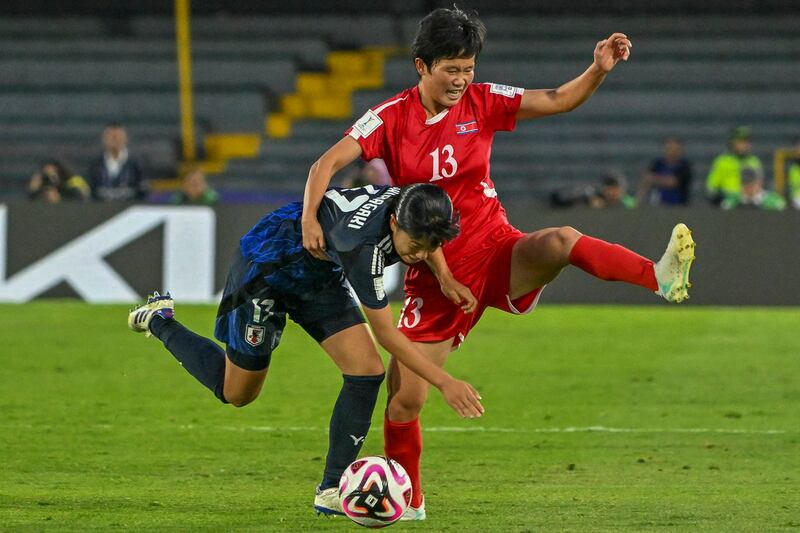Updated on Sept. 25, 2024 at 11:01 ET
North Korea’s Under-20 women’s national soccer team defeated both the United States and Japan on its way to winning its third World Cup – a victory that authorities used to boost morale in the country still suffering from floods this summer.
Monday's 1-0 victory over Japan in the final in Bogota, Colombia, was splashed on the front page of the Rodong Sinmun. That's highly unusual for the main state-run newspaper, which normally runs articles and editorials about supreme leader Kim Jong Un.
"The front page of the Rodong Sinmun is decided by Kim Jong Un himself or by Kim's Secretariat," said Lee Hyun-seung, a researcher at the U.S.-headquartered Global Peace Foundation, who escaped from North Korea and settled in the United States.
“North Korean citizens may think, 'We beat Japan and U.S. imperialism and won the Women’s World Cup.' In that sense, Kim Jong-un probably gave the order” to publish the article on the front page, he said.
The win puts North Korea in the same company as women’s soccer powerhouses Germany and the United States, which have also won the U-20 competition three times each.
Inspiring patriotism
In late July and early August, northwestern North Korea suffered flooding from heavy rains, destroying many homes and farms.
Officials told RFA Korean at the time that North Korea refused offers of help from China to rescue people living on islands in the Yalu River between the countries out of fear that those rescued would try to escape to China permanently.

“Flood recovery work is underway right now but North Korea has nothing notable to achieve,” Lee said. “There were no economic or cultural achievements, and the only achievements are related to missile and nuclear development.
“But now that there are achievements in the sports field, Kim Jong-un may think that he has saved face,” he said.
Video from state-run Korean Central News Agency, or KCNA, showed people in the capital of Pyongyang looking at photos and articles about the team displayed on screens in subway stations and on their cell phones.

“It is effective because watching sports inspires patriotism and sends support and passion to their athletes,” Lee said. “Of course, the citizens like it. If a small country like North Korea achieves something, it is even more encouraging.”
Hug a police officer
Monday’s game-winner came in the 15th minute when 17-year-old Choe Il Son dribbled in from the right side, sending a left foot shot past Japanese goalkeeper Akane Okuma’s outstretched hands. That made Choe the competition’s leading scorer with six goals.
Choe had grabbed attention earlier when a photo showed her publicly hugging a police officer after her team defeated the United States in the semifinal in Cali on Sept. 18.
It was a rare display of emotion for North Korean athletes, who generally keep contact with outsiders to a minimum.

But Choe said that she was actually approached by the female officer.
“There is really nothing special behind it, it’s just that the citizens of Cali and the police have all gotten to know us,” she told Femina Football, a Colombian media outlet which exclusively covers women’s soccer.
“The police and I have become very familiar with each other since the preliminaries and came all the way up to this point together, so she was happy and hugged me.”
Young individualism
The hug might point towards a more individualistic upbringing that North Korea’s younger generation experienced.
These women were born during or after the 1994-1998 North Korean famine, an effect of the country’s centrally planned economy failing to absorb the shock that resulted from the collapse of the Soviet Union and a cessation of aid from Moscow.
In the years following that catastrophe, government salaries were nowhere near enough to live on, and people had to rely on themselves to make a living, usually by selling goods and services in the local jangmadang, or marketplace.

The people therefore have grown less accustomed to collectivism over time, and are more difficult to control, according to Kim Sookyung, who escaped North Korea in 1998 and settled in Virginia.
“First of all, there is nothing the country can do in (its current economic) situation,” she said. “A sense of rebellion is bound to arise sooner or later. Those people have no choice but to be individualistic. They are exposed to a lot of foreign cultures unlike the older generation.”
This trend can be observed in other young North Korean athletes, who freely exchanged badges or took selfies with other athletes on the medal podium at the Olympics in Paris this summer.
This could suggest that authorities have recently begun allowing North Korean athletes to have light contact with outsiders, said Ahn Sung-hyuk, a North Korean escapee who is currently a student at Syracuse University.
“The State Security Department monitors all North Koreans overseas,” said Ahn. “Every single action is being monitored, so I think they may have been given permission to act like that.”
At the Olympics, after Ri Jong Sik and Kim Kum Yong of the North Korean mixed doubles table tennis team took pictures with Lim Jong-hoon and Shin Yu-bin of the South Korean team during a medal ceremony, observers were concerned that they could be punished, but they were featured prominently on state TV.
Translated by Claire S. Lee. Edited by Eugene Whong and Malcolm Foster.
Update adds clarification about Lee Hyun-seung and the Global Peace Foundation.
